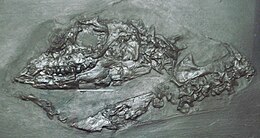This article includes a list ofgeneral references,butit lacks sufficient correspondinginline citations.(October 2021) |
Paraplacodus broiliiis anextinctplacodontsauropterygianfrom theMiddle Triassicepoch,from theAnisianuntilLadinianstages.Thefossilswere uncovered in NorthernItalyand the species was named in 1931 byBernhard Peyer.Paraplacodusmeans "AlmostPlacodus",in reference to its similarity toPlacodus.
| Paraplacodus Temporal range:Middle Triassic
| |
|---|---|

| |
| Fossil skull | |
| Scientific classification | |
| Domain: | Eukaryota |
| Kingdom: | Animalia |
| Phylum: | Chordata |
| Class: | Reptilia |
| Superorder: | †Sauropterygia |
| Order: | †Placodontia |
| Genus: | †Paraplacodus Peyer,1931 |
| Species | |
| |


Like the majority of described placodonts,Paraplacoduswas an aquaticreptilethat fed onshellfish,though recent research suggests its diet was broader and not solely composed of hard-shelled organisms.[1]Most known placodont species can be divided into two groups - the unarmored placodontoids, which would resemble a large, scaly, tooth-fillednewt,or the armoredcyamodontids,which would resemble a heavily armoredturtle;Paraplacodusbelonged to the former family. It was a small reptile, measuring about 1.5 metres (4.9 ft) in total body length.[2]
The jaws ofParaplacoduswere adapted to eat shellfish, with three pairs of protrudingteethin the top row and two rows of protruding teeth in the front of thejaw,with rounded crushing teeth in the upper and lower jaws. Thickribsformed abox-likeribcagewith an almost-square cross-section, which enabledParaplacodusto remain close to theseabedwhile hunting for food.
References
edit- ^Gere, Kinga; Nagy, András Lajos; Scheyer, Torsten M.; Werneburg, Ingmar; Ősi, Attila (5 February 2024)."Complex dental wear analysis reveals dietary shift in Triassic placodonts (Sauropsida, Sauropterygia)".Swiss Journal of Palaeontology.143(1): 4.doi:10.1186/s13358-024-00304-x.ISSN1664-2376.PMC10844150.PMID38328031.
- ^Rieppel, O. (2019).Mesozoic Sea Dragons: Triassic Marine Life from the Ancient Tropical Lagoon of Monte San Giorgio.Indiana University Press. p. 116.doi:10.2307/j.ctvd58t86.ISBN978-0253040114.S2CID241534158.
- Dixon, Dougal (2006).The Complete Book of Dinosaurs.Hermes House.